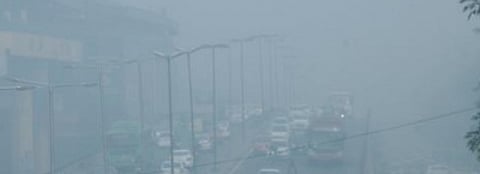Delhi Air Quality worsens. (IANS)
Delhi Air Pollution: AQI worsens despite imposing GRAP stage-III
New Delhi: A view of the India Gate seen hazy amid dense smog on a cold day, in New Delhi on Monday, December 19, 2022. (Photo: Anupam Gautam/IANS)
Despite imposing stage-III of the Graded Response Action Plan (GRAP) as well a ban on construction works, the Air Quality Index (AQI) of Delhi deteriorated to 395 under the "very poor" category, with some parts of the national capital recording AQIs over 400 or "severe".
The AQI at the IGI Airport, Delhi University and Pusa Road were the highest at 438, 415 and 404, respectively, under the "severe" category, according to the System of Air Quality and Weather Forecasting And Research (SAFAR).
Dhirpur, Ayanagar and Lodhi Road reported AQIs at 391, 379 and 377, respectively, under the "very poor" category.
SAFAR has predicted that the overall AQI in the national capital will be in the "severe" category on Tuesday.
An AQI between zero and 50 is considered 'good'; 51 and 100 'satisfactory'; 101 and 200 'moderate'; 201 and 300 'poor'; 301 and 400 'very poor'; and 401 and 500 'severe'.
Last week, the Central Pollution Control Board (CPCB) had ordered to reinforce a strict ban on construction and demolition activities in the entire NCR and a nine-point action plan as per stage-III of GRAP became applicable with immediate effect.
This was in addition to the preventive and restrictive actions under Stage-I and Stage-II of GRAP, which are already in place.
Before releasing the order, a meeting was held with the sub-committee which comprehensively reviewed the air quality scenario in the NCR as well as the forecasts for meteorological conditions and AQI of Delhi.
While assessing the overall air quality parameters, the sub-committee noted that the air quality had suddenly and unexpectedly deteriorated owing to dense foggy conditions without much sunlight and very low temperatures, coupled with calm winds and stable atmospheric conditions.
The experts said that with pollution levels in the city at an all-time high, Delhi residents are at a high risk of respiratory and cardiovascular ailments, more so, in people with allergies.
"It is important to limit exposure and using masks as the first line of defence is your best bet for protection. Make sure you upgrade your cloth mask to one with a better filtration mechanism like an N95 or FFP2 S to keep out all kinds of particulate matter as well as infection causing germ," the experts suggested. (SJ/IANS)


